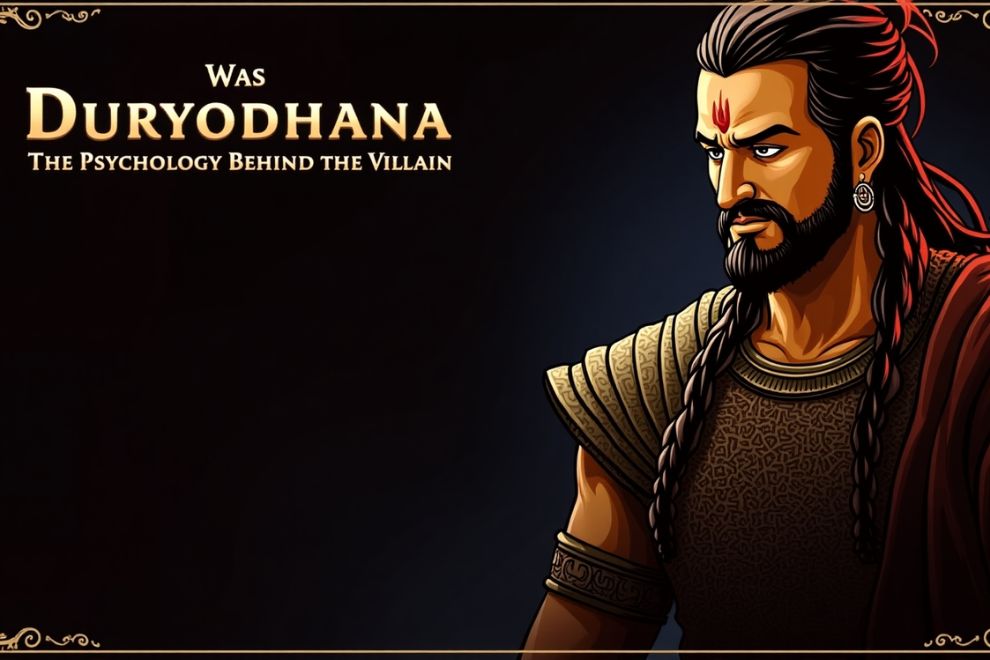Beyond Good and Evil
In Indian mythology, the Mahabharat stands as a vast ocean of moral lessons, character studies, and epic conflicts. Among its most controversial figures is Duryodhana, often painted as the primary villain. But was he truly evil—or simply misunderstood? In a world dominated by black-and-white portrayals, Duryodhana is a deeply gray character. This article explores his psychology, the circumstances that shaped him, and why he may be more tragic than tyrannical.
Born a Prince, Raised in Comparison
From the moment of his birth, Duryodhana was thrust into a world of rivalry and expectation. As the eldest son of Dhritarashtra, the blind king of Hastinapur, he was the rightful heir by lineage—but not by merit, according to many. Constant comparisons to the Pandavas, especially Yudhishthira and Bhima, sowed seeds of jealousy and resentment.
Duryodhana wasn’t evil at birth. He was molded by circumstances, favoritism, and a deep desire to be accepted and seen as worthy.
Friendship with Karna: Loyalty or Insecurity?
One of the most defining relationships in Duryodhana’s life was with Karna, the abandoned prince with unmatched skills. Duryodhana made Karna king of Anga, not just out of generosity, but perhaps out of strategic need. Karna was his answer to Arjuna. Some see this bond as loyalty, others as a manipulative alliance.
But dig deeper, and you’ll find Duryodhana longing for validation—a recurring psychological theme in his life. Karna was one of the few who treated him as an equal, not as Dhritarashtra’s flawed son.
The Psychology of Envy and Entitlement
Envy isn’t born in a vacuum. Duryodhana watched the Pandavas gain fame, respect, and divine blessings. Despite his status as a prince, he was often sidelined in favor of Yudhishthira’s dharma, Arjuna’s valor, or Krishna’s wisdom.
This envy, mixed with a strong sense of entitlement, transformed into bitterness. Duryodhana didn’t desire war for the thrill—he believed he was robbed of what was his. His war was, in his mind, justice, not evil.
Was He Really Adharmic?
The Mahabharat is a story of dharma vs. adharma—but Duryodhana’s dharma is personal. He upheld his version of truth. He stood by Karna, supported Ashwatthama, and defended his people.
When Krishna offered peace, Duryodhana famously rejected it, saying he wouldn’t give even a needlepoint of land to the Pandavas. Was this arrogance or the final cry of a man who felt abandoned and cornered?
Krishna’s View of Duryodhana
Even Krishna, the divine strategist, acknowledged Duryodhana’s strength, conviction, and loyalty. He saw him as a fallen hero, not just a villain. After Duryodhana’s death, Krishna reportedly said:
“Duryodhana died as a true Kshatriya—facing his enemy in battle, with courage in his heart.”
This perspective complicates the black-and-white view of Duryodhana as evil.
The Modern Mirror: Duryodhana in Today’s World
In modern psychological terms, Duryodhana represents the alienated child, the misunderstood leader, the one who turns bitter because he was never allowed to shine in his own light.
He’s the person in the office constantly compared to others. The sibling who is always second. The friend who tries to keep up but is always told they’re not enough.
His fall wasn’t because of pure evil—it was because no one helped him handle rejection, comparison, and pain.
A Villain or a Victim?
Duryodhana wasn’t born evil. He was a product of societal expectations, emotional neglect, and toxic comparison. His story is not just a tale of destruction, but also a cautionary tale about what happens when empathy is absent.
In understanding Duryodhana, we understand ourselves better—our insecurities, ambitions, and the desire to be seen.


